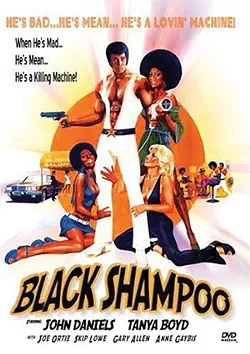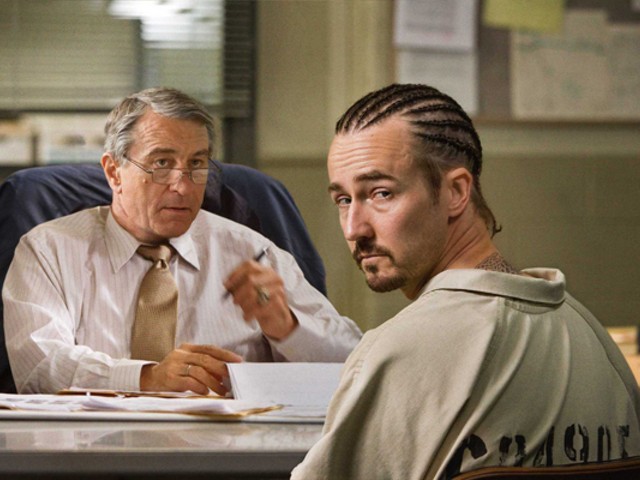Trash cinema or schlock glories?
Mike White brings it on in a new book and Burton Theatre screening by Michael Jackman
In 1951, renegade French film critics founded the Cahiers du Cinema, a magazine that revolutionized film criticism. In 1994, Michigander Mike White founded Cashiers du Cinemart, a zine that openly mocked big-budget mainstream films. Over the years, though, it became more than a slaughterhouse for Hollywood's sacred cows, publishing meticulously researched articles about obscure film figures, including such underappreciated writers as David Goodis and James Ellroy, and such unsung auteurs as Keith Gordon and John Paizs — not to mention bringing attention to virtually unknown films, such as 1975's Black Shampoo. The zine moved exclusively online a few years ago, and now White has compiled some of its best pieces into a handsome paperback, Impossibly Funky. We chatted with him recently.
Metro Times: What did your zine look like when you started in 1994?
Mike White: It was, like, 12 pages of black-and-white photocopies made off a typewriter, literally cut-and-pasted and photocopied at work when I was working late at night. I had a postage machine on my day job, and when I was alone in there I'd just crank it out. I did that for the first three issues, until it started getting too bulky for that.
MT: Did you have a lot of subscribers?
White: [laughs] At first I was all about getting subscribers, but each issue kept getting bigger, and it would cost more to mail, and all the subs I'd gotten earlier would be eaten up by the cost of mailing and printing. Finally, I was like, "I don't want subscriptions anymore!" Toward the end I had 30 subscribers, but I was sending out a couple thousand to distributors, and that's where I was getting money from.
MT: When did you get slicker?
White: Issue 5 was my first desktop-published issue. That was the first one with Nathan Kane of Bongo Comics doing cover art, and he did it for eight issues. That was also the first one with an interview: Bruce Campbell! That was like a big deal for me.
MT: What's the fascination with Bruce Campbell?
White: He's such a relatable guy, I always pull for him. I'm so excited he's doing the whole hometown-boy-made-good thing, because there aren't a whole lot of those around, really. It's not like I go crazy when Ted Nugent is in town, but I'll see any old piece of crap that Bruce is in. I think he knows that a lot of the things he's in are pieces of crap, really, but at the same time I'm excited when he's in the bigger movies. Especially like Hudsucker Proxy, just to have him up on screen with Jennifer Jason Leigh and Paul Newman.
MT: Your book says it contains "13.2 percent new material." What's up with that?
White: It's not mathematically accurate, but it's pretty true, I've retouched pretty much every article that's in the book. I went back in and punched it up a little, corrected things that changed over time. The piece on Tarantino was 16 years old, for instance, so I wanted to make sure I corrected stuff where I could. Talking about Todd Phillips, we said he had directed the GG Allin movie, Hated, and now he's gone on to do Starsky and Hutch and The Hangover.
MT: I know that Cashiers du Cinemart title is a gag, but you've got some stuff in common with those 1950s French critics — for instance, an earnest fascination with hard-boiled American fiction.
White: Definitely. Also, the writers of the Cahiers were more into the smaller B-pictures than the major Hollywood productions. They thought that's where the really fascinating stuff was, looking at the movies that were being churned out by B-directors like Raoul Walsh and Sam Fuller. And I like to think I'm doing the same thing with other schlockmeister directors.
MT: I'm ashamed to admit I had never heard of David Goodis, James Ellroy or John Paizs. Or Black Shampoo. Where do you find the obscure stuff?
White: Sometimes you stumble onto them in dollar bins at the video store, if the title looks fascinating. I mean, hearing the title Captain Milkshake, like, what the hell kind of movie can be called Captain Milkshake? And it's actually a sobering look at Vietnam that came out before Easy Rider did, and did a lot of the things that Easy Rider tried to do. The main character is a soldier rather than a biker, so it gives you the perspective of a soldier who knows that he's going to have to go back to war. It used color film for the Vietnam sequences and black-and-white for the sequences at home. You'd think it would be the exact opposite, that war would be black-and-white and vice versa. But war was so much more powerful for him in his memory that he remembers it vividly.
MT: Were you always a fan?
White: I think so. My mom used to take me to the show all the time. We'd buy some fast food and sneak it in to catch a matinee. Or I used to skip school and go to the show. My mom wasn't that concerned about taking me to kids' movies. She was fine with pretty much everything. I was a good little boy and just sat there and watched and didn't cry. My parents would let me watch anything, except they'd make me close my eyes for that sex scene in The Jerk between Steve Martin and a biker chick.
MT: You're still writing about film, but you're done with the magazine. Do you think the Internet is picking up the slack when it comes to discussing these obscure pictures?
White: I think so ... but sometimes it just gets frustrating when I see the same headline coming out on 10 websites the same day. I heard The Avengers are going to be on TV, but I didn't have to hear that 10 times. I like Cinebeats. It's great, that's what I want.
MT: And they lack depth.
White: Exactly. They'll just say what everybody else is saying. Is everybody just copying off an AP story?
MT: You'd rather talk about the ones you love and nobody knows about.
White: Exactly.
MT: Films such as, no doubt, Black Shampoo, which you're screening Sunday night at the Burton. I know it's one of your favorites. Can you give us an idea of what to expect.
White: It's a movie from the mid-'70s, kind of like blaxploitation's answer to Hal Ashby's Shampoo. Its protagonist is the baddest hairdresser on the Sunset Strip, a lothario doing his client's hair — and other things as well — and he finds that the love of his life has been sitting at the receptionist's desk the whole time. But she has had former dealings with the mob, and he ends up having to fight them for her, using sometimes a pool cue or a chainsaw to get her back. The 15-minute chase at end is a tour de force.
MT: So why does this film languish in obscurity?
White: It's somewhat offensive. It's softcore sexploitation, and some people don't really embrace blaxploitation that much. Hopefully with movies like Black Dynamite, people will go back and look at some of these films. The poster for Black Dynamite is right off the Black Shampoo poster, which is great.
MT: The magazine's done, the book's out, but you're still writing about film, right? What obscure genre have you found now?
White: I'm doing a Paracinema piece about movies starring talking genitals [laughs], so I'm still definitely looking for subgenres. Yeah, that's what I did with my summer: watching eight or nine films like that, including Pussy Talk, a French porn film with talking genitals.
MT: What's that like?
White: Kind of like Chatterbox, but a little less funny.
Join Mike White this weekend for readings, book signings, discussions, short films and a screening of Black Shampoo. At 2 p.m., Sunday, Oct. 24, at the Burton Theatre, 3420 Cass Ave., Detroit; 313-473-9238.






